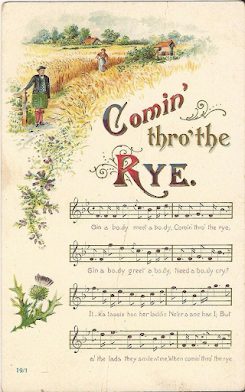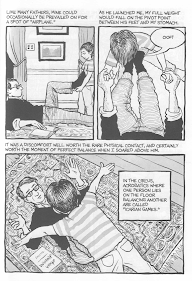Holden Treading in the Rye
We are given a window into Holden’s character when he tells Phoebe his interpretation of the Robert Burns poem, “Comin thro’ the Rye.” He had heard a little boy singing it as “body catch a body, coming through the rye” instead of the original “body meet a body, comin thro’ the rye.” He says how he imagines children running through fields of rye, and his dream job would be to catch them from falling off the cliff. Although it is only a small passage, its meaning resonates with Holden’s character throughout the novel.
Catcher in the Rye shares just a phrase of the poem “Comin thro’ the Rye,” and we can only rely on Holden’s interpretation to understand the poem’s significance; however, when I read it in its entirety, I found that the poem itself--not just Holden’s mishearing of the line--is a reflection of his character as well. In the first verse, the narrator of “Comin thro’ the Rye” describes a scene that he’s watching of a girl, Jenny, who is in a harrowing state:
“ Oh Jenny 's a' weet poor body
Jenny 's seldom dry,
She draigl't a' her petticoatie
Comin thro' the rye.”
She is worn and disheveled, and in the second verse, the narrator seems to explains why she is in this state:
“Gin a body meet a body, comin thro' the rye,
Gin a body kiss a body, need a body cry;
Ilka body has a body, ne'er a ane hae I;
But a' the lads they loe me, and what the waur am I.”
From my understanding, the narrator comes across Jenny and her “a’weet poor body” being taken advantage of by these other lads. The phrase, “Gin a body kiss a body, need a body cry,” creates the impression that the “kiss” is being forced upon Jenny. The narrator sees her situation, yet his relationship with the lads--“But a’ the lads they loe [love] me”--is what stops him from helping her. It sounds like the narrator wants to be careful not to cause trouble with the lads and is afraid to rescue Jenny. It also becomes apparent in several phrases of the poem that the narrator is conflicted whether or not to tell others about what he has witnessed. He says, “Gin a body kiss a body —/Need the warld ken [know]!” and “Gin a body kiss a body, need a body tell.” It’s as if he’s trying to convince himself that he doesn’t have to do anything, but by the end, he seems to feel an encroaching fear of guilt, as he is unable to protect her. The narrator feels powerless in a way, a recurring theme for Holden as well.
There are moments when Holden gives us an honest reflection of the significant people in his life, particularly Allie, Jane Gallagher, and James Castle. Innocence and vulnerability are preserved in these three characters, yet Holden seems to feel that he has failed to be their “catcher in the rye;” he has let them fall off the cliff. Allie is the initiation of Holden’s spiral into guilt and desire to save the others. There was no justification for Allie’s death, and Holden feels powerless. He couldn’t have done anything to save Allie, but looking back, Holden also feels guilty for the times he didn’t spend with him. Like when Holden is at the motel and talks to Allie, telling him to go get his bike and meet up with him and his friend. He says, “It wasn’t that I didn’t use to take him with me…But that one day, I didn’t…I keep thinking about it anyway when I get very depressed” (Salinger 99). Holden also has no control in Jane Gallagher’s situation, but he is aware that Jane is in trouble, which makes him feel worse for not “rescuing” her. He knows that there is something going on between Jane and her mom’s drunkard of a boyfriend, but they are both young, and all he can really do is console her.
Holden had the most potential to save James Castle, but again he fails. Although Holden claims he didn’t know him very well, James Castle must have felt somewhat of a connection with him. When he chooses to jump out of the window rather than be bullied, he is wearing Holden’s sweater that he had borrowed. While this scene can be interpreted in several ways, I think it is a symbol for a failed “catcher in the rye.” Holden knew that James Castle was being bullied, but like the narrator in the poem, Holden doesn’t help him. He has the same guilt that the narrator experiences, this powerless feeling. Holden regrets the actions (and inactions) of his younger self, and it weighs heavily on him. It’s the kind of realization--understanding your choices have consequences--that can only come from being in the process of coming of age.
Although both Holden and the narrator of “Comin thro’ the Rye” experience guilt, Holden’s coming-of-age narrative influences his desire to become the “catcher in the rye.”


Great post! That's so cool that you found the poem! I agree with you fully that Holden views himself as some sort of protector or "catcher in the rye" and that there are multiple instances where he feels he has failed. You can see him trying to be the protector when he keeps an eye on Pheobe and does not run away for her sake, and when he stays with the little kids when they go to see the mummies. In addition, I believe that you can see him feeling like a failed protector, when he punched Stradlater, and was probably regretting letting Jane be in danger.
ReplyDeleteGood post! I like how you made comparisons between the original poem and Holden's journey-- especially the line where the narrator doesn't help because of the other boys. I think Holden is desperate to prove that he will stick to his ideals and not act 'phony' despite the disapproval of those around him. He feels like a failed protector with James Castle, Allie, and I like how you mention to some extent, Jane Gallagher.
ReplyDeleteThe poem is cool! Props to you for interpreting it because I didn't get it after the first read through. I think the message is similar but different to what/how Holden thinks because I don't feel Holden trying to gain approval from others when catching/trying to catch the people in the rye. I also like your specific categorization of Allie, Jane, and James as people Holden couldn't catch, and I think his guilt is really important and obviously plays a huge role in his life, even if the events he feels remorse for were out of his hands.
ReplyDeleteThis is a great post and I really admire the work you put in to analyze the poem. I definitely agree that despite Holden's desire to be someone like the catcher, he doesn't put in the effort to carry it through. This definitely reflects the coming of age realization that he isn't as able as he thought, and perhaps provokes an internal storm of who he actually is.
ReplyDeleteI like how you compared Holden's own feeling of powerlessness to the real meaning of the poem. There are so many instances of symbolism between someone falling off that cliff and Holden . You brought up a great example with James Castle and the sweater he borrows from Holden (which he's wearing when he dies). Holden really does need to be that "catcher in the rye", but he first has to save himself from falling off that cliff. His battle with his own coming of age and powerlessness when trying to help others ultimately leads him down a dark, guilt-ridden path that he can't really escape. I think you explained that really well. Great post!
ReplyDelete